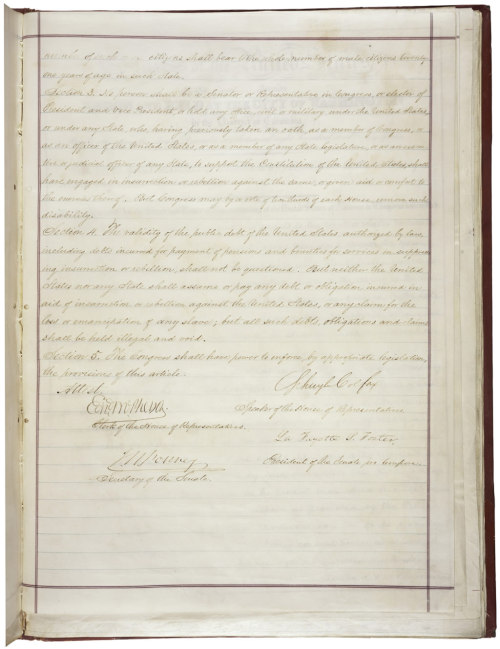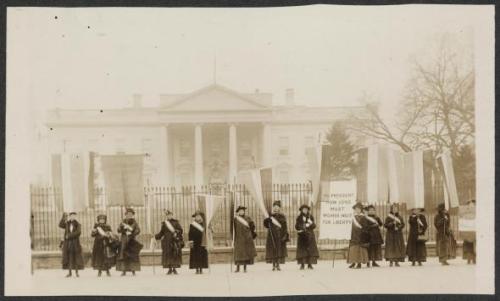#14th amendment
On Thursday, September 29 at 7pm, celebrate the 150th anniversary of the passage of the 14th Amendment with a look at how it defines U.S. citizenship, its connection to America’s “Second Founding” (the passage of the Reconstruction amendments), and the interpretation of these topics at National Park Service sites.
This free public program features Rep. James Clyburn (SC) as the keynote speaker. Elizabeth Wydra will moderate a discussion with Michael Allen, National Park Service Southeast Region Community Planning Specialist; Turkiya L. Lowe, National Park Service Southeast Region Chief Historian; and Northwestern University Professor Kate Masur.
Post link
I’ll be back to my usual BS about anime men and 90s music soon, but right now, I’ve got Constitutional law on my mind. Instead of ranting about unelected judges or old white men, fight back by learning their tricks! Understand how and why this leaked opinion’s bombshell isn’t about abortion. It’s about restricting rights that aren’t explicit in the Constitution. The leaked draft in the Dobbscase would absolutely endanger, to varying degrees, the right to:
- Marry (same sex and/or interracial marriage)
- Have children (adoption and sterilization)
- Have certain kinds of consensual sex (sodomy)
- Custody of children
- Keep a family together
- Purchase and/or use contraceptives (even if married)
- Control the upbringing of your child (sending kids to parochial schools and/or homeschooling)
- Refuse medical treatment
- Maybe even some parts of the Bill of Rights like free speech if we go down the darkest timeline’s hardcore fundamentalist path.
Why? Because these rights all share an underlying analytical framework with the right to have an abortion pre-viability without an undue burden. These are all “fundamental rights” (that’s the legal term, not philosophical opinion) under the:
- Fourteenth Amendment - aka the post-Civil War one that applies to state governments and has an explicit Equal Protection Clause AND Due Process Clause. Which fundamental rights are protected by which clause? The difference is mostly semantic, although choosing one clause over the other can put a spin on the case making a certain outcome more likely. The Supreme Court has also found previously that the 14th Amendment “incorporates” most of the Bill of Rights and applies those limits to state governments. The first 10 amendments otherwise apply only to the federal government. Without this Court-made interpretation of the 14th Amendment, your state government could absolutely stop your free speech, for example. It’s meant to limit racist states, basically.

- Due Process Clause of the Fifth Amendment - Yep, double due process, because this one only applies to the federal government! But, fun fact, the Supreme Court has decided this due process clause should be read to “include” equal protection so the federal government is limited by equal protection too. Another Court-made protection that matters.
- Ninth Amendment (it says the naming of certain rights in the Constitution should not be read as disparaging/prohibiting other rights retained by the people). There aren’t any Ninth Amendment rights, technically, but it’s validation that the Constitution CAN protect rights that aren’t explicitly written into the document.
So, how do we decide what is, legally, a fundamental right protected from federal AND state government interference? And which Amendment and clause do we use to give life to that right?
It turns out there’s no strict test. Really! Each fundamental right is established slowly over time, based on a variety of factors. It was kept flexible by design, so rights can be added and expanded. That’s what drives conservatives mad, because they want hard & fast rules. And that’s what this Dobbs draft opinion attacks. The “holding” in the draft — meaning the most important, binding legal part — says “The Constitution makes no reference to abortion, and no such right is implicitly protected by ANY constitutional provision, including…the Due Process Clause of the Fourteenth Amendment.” The draft opinion then follows a three-part structure explaining:
- “the standard our cases have used in determining whether the Fourteenth Amendment’s reference to ‘liberty’ protects a particular right.” This is a specific reference to the Due Process Clause of the 14th Amendment: “nor shall any State deprive any person of life, liberty, or property, without due process of law”
- “Whether [abortion] is rooted in our Nation’s history and tradition and whether it is an essential component of what we have described as ‘ordered liberty.’” This distinction between “liberty” and “ordered liberty” is invented by the Supreme Court, as the 14th Amendment just says “liberty.” But it’s been used for a long time and isn’t controversial.
- “Whether a right to obtain an abortion is supported by other precedents.”
Do you see the judicial sleight of hand?
There wasn’t a unified test for finding a “fundamental right” implicit in the Constitution. But this opinion immediately dismisses the equal protection clause (calling it inapplicable to abortion), and the 5th and 9th Amendments (saying Roe didn’t consider them so the Court must ignore them now), leaving only the Due Process Clause of the 14th Amendment as the basis for finding a fundamental right. Having isolated this clause, the opinion then goes straight for the heart of it, saying fundamental rights can be found only if the right is objectively, deeply rooted in history, because that subset of “ordered liberty” is the ONLY kind of “liberty” the Due Process Clause is capable of protecting. This slashes the scope of the clause and establishes a high bar that hasn’t been required in other cases.

The draft isn’t subtle about it either.
“In interpreting what is meant by the Fourteenth Amendment’s reference to liberty, we must guard against the natural human tendency to confuse what that amendment protects with our own ardent view about the liberty that Americans should enjoy.” Then the draft says it seeks to “set the record straight” on Roe’s “faulty historical analysis,” even though that wasn’t the test used by the Roe court and the subsequent cases supporting Roe. (And, FWIW, the 66-page Roe opinion contains literally dozens of pages of historical analysis, including notes on how abortion and infanticide was practiced by ancient Greeks and Romans. Dobbs dismisses it all as “irrelevant”.)
Instead of any strict test, Roe recognized that the pre-existing Constitutional right of privacy was “implicit in the concept of ordered liberty.” (There’s our “ordered liberty” again! See, RoeandDobbs look at the same precedent and come out with completely different conclusions, which is not supposed to happen! But I digress.) Pre-Roe, the existing privacy right guaranteed a “zone of privacy” encompassing marriage (though only hetero at the time), procreation, contraception, child rearing & education, and more. Roe reasoned if all other rights in that zone could not be infringed by the federal or state government in any way, then the Constitution should extend a right protecting abortions from almost all government interference “pre-viability,” meaning before a fetus could survive outside a pregnant person.
Why viability? Because the government interest in the fetus needs to be BALANCED with the “separate and distinct” interest in “preserving and protecting the health of the pregnant [person].” Both fetus and pregnant person must be considered.

Simply put, “the pregnant [person] cannot be isolated in her pregnancy. She carries an embryo, and later a fetus…” Abortion is different from other fundamental rights in that we inherently have a clash of competing rights, and that’s why abortion is not, and never has been, a complete, unfettered right throughout the whole pregnancy. It’s also why there must be exceptions for the life or health of the pregnant person. In achieving this balance, Roe said it
“need not resolve the difficult question of when life begins. When those trained in the respective disciplines of medicine, philosophy, and theology are unable to arrive at any consensus, the judiciary, at this point in the development of man’s knowledge, is not in a position to speculate as to the answer.”
On the flip side, Roe said federal and state governments could regulate abortion once they had “-“a rational basis” for the regulation AND a “compelling government interest” in the health, safety, and welfare of the fetus; aka after the fetus is viable apart from the pregnant person. The “rational basis” part just indicates the level of justification needed to uphold a law from a constitutional challenge. “Rational basis” is the bottom level of justification, and it means the government law/regulation almost always wins — in which case, the only check on government overreach is elections. (If you don’t like a law that is constitutional, vote the bastards who wrote it out of office.)
TheDobbs draft finds that, of course, abortion is NOT a right “deeply rooted in the Nation’s history and traditions” because “tradition” criminalized abortion. The fact that abortion was criminalized at all stages of pregnancy in the majority of states in 1868, when the 14th Amendment was ratified, means we don’t have a protected Constitutional right to abortion today. Because history. The Court ignores the minority of states that didn’t criminalize early abortions or didn’t actively prosecute abortion. The Court ignores that these anti-abortion laws were written at a time when women couldn’t vote or serve in public office. It doesn’t matter that medical science has advanced. Because history. It doesn’t matter if atheists or some religions, like Reform Judaism, don’t believe life begins at conception. It doesn’t matter that attitudes and laws about abortion changed in the 20th century. Because history.
In short, Dobbs stands for the proposition that “fundamental rights” have gone too far. “These attempts to justify abortion through appeals to a broader right to autonomy and to define one’s “concept of existence” prove too much. Those criteria, at a high level of generality, could license fundamental rights to illicit drug use, prostitution, and the like.” ……Well, why can’t there be a fundamental right for an adult to engage in whatever type of work they want, including sex work? The government could still impose regulations on sex workers as long as such regulations are necessary to achieve a compelling government interest, and are narrowly tailored to that interest. A very high level of justification, yes, but not impossible. Oh, but our Nation’s Puritan history….. /s
As if that’s not enough, there’s one more “gotcha” lurking in the draft. Remember where I said “rational basis” means the government almost always wins? Well, the Dobbs opinion would move the standard from “government almost always loses” to “government almost always wins.” Going forward,
“rational basis review is the appropriate standard for … challenges [to abortion laws]. As we have explained, procuring an abortion is not a fundamental constitutional right because such a right has no basis in the Constitution’s text or in our Nation’s history. … It follows that… [a] law regulating abortion, like other health and welfare laws [that do not touch fundamental rights], is entitled to a ‘strong presumption of validity.’”
This section does do a good job of specifying “abortion laws” rather than “Fourteenth Amendment” generally. BUT note the logic flow: abortion is not a protected fundamental right—> because history!!—> government can regulate abortion pretty much unchecked except for elections.
This is unequivocally a framework that could be used to roll back rights.
It’s true the new rule might not actually be used this way. Dobbs says, “[W]e emphasize that our decision concerns the constitutional right to abortion and no other right. Nothing in this opinion should be understood to cast doubt on precedents that do not concern abortion.” These kinds of limiting statements appear with some frequency in Supreme Court decisions, and they can stop a case from being used as precedent. But they’re not always binding, especially where the limiting language isn’t baked expressly into the legal “holding” of the case. In Dobbs, the “holding” is that no fundamental right to abortion exists under any part of the Constitution, including the Due Process Clause of the Fourteenth Amendment, because history. That holding is too broad for my comfort level.

The Wall Street Journal’s editorial board argued that there is no risk to other fundamental rights because rights like gay marriage and contraception are so integral to our lives and so non-controversial as to withstand any challenge. …. Hmmm, I’mma let YOU decide if you believe that’s true. This Atlantic article argues that abortion is different from other fundamental rights because abortion causes harm to a “non-consenting” fetus…but Roe expressly recognized this fact as part of its viability analysis and attempt to balance rights of fetus AND pregnant person, yet Dobbs proposes to eviscerate Roe anyway. I suppose it’s not a shock that conservatives aren’t interested in any balance for the pregnant person; they’re the same people who disregard the rights of shooting victims in the face of the right to bear arms. Then again:
“To look at the act which is assertedly the subject of a liberty interest in isolation from its effect upon other people is like inquiring whether there is a liberty interest in firing a gun where the case at hand happens to involve its discharge into another person’s body.” — conservative Justice Scalia’s Casey abortion dissent quoting Justice White (who was nominated by JFK but frequently ruled with the Court’s conservative bloc)
Yeah, my head hurts too, so let’s wrap up with one last paragraph before the conclusion: Fundamental rights don’t require two consenting parties; for example, using contraception, refusing medical treatment, or choosing to homeschool your child. The same Atlantic article also mentions “reliance,” meaning the Supreme Court is more hesitant to overrule precedent if it would upend advance planning of great precision. For marriage, that’s true — a sudden invalidation of millions of marriages would be catastrophic. But just as Dobbs says that’s not true for abortion (“getting an abortion is generally unplanned activity”), it’s not true of other fundamental rights either (eg, for consensual sex/sodomy laws, I can imagine someone saying, “well just stop having that kind of sex”). The point stands that the proposed Dobbsframeworkcould make other fundamental rights vulnerable.
The “could” IS the problem. Because someone in some red state will almost certainly use this new framework to probe the limits of rights we thought we had. Perhaps the rights will stand; perhaps not. That uncertainty IS the damage. Re-litigating and re-assessing what has already been decided. Constantly worrying if rights we took for granted for decades will be taken away. Even if we do ultimately keep our fundamental rights, this Supreme Court is inviting them to be challenged, and is going to make us fight HARD for every last scrap.
Why overturning Roe v. Wade is dangerous for everyone
Why overturning Roe v. Wade is dangerous for everyone
I’ve never been a fan of abortion. I realize that no one is actually a ‘fan’ of abortion, but you know what I mean. Anyway, back in my more conservative days, I called for the overturning of Roe v. Wade.
My reason for opposing abortion was not related to religious reasons, even though I was raised Roman Catholic. I was adopted, and because of this, I felt like if abortion had been legal in the…





